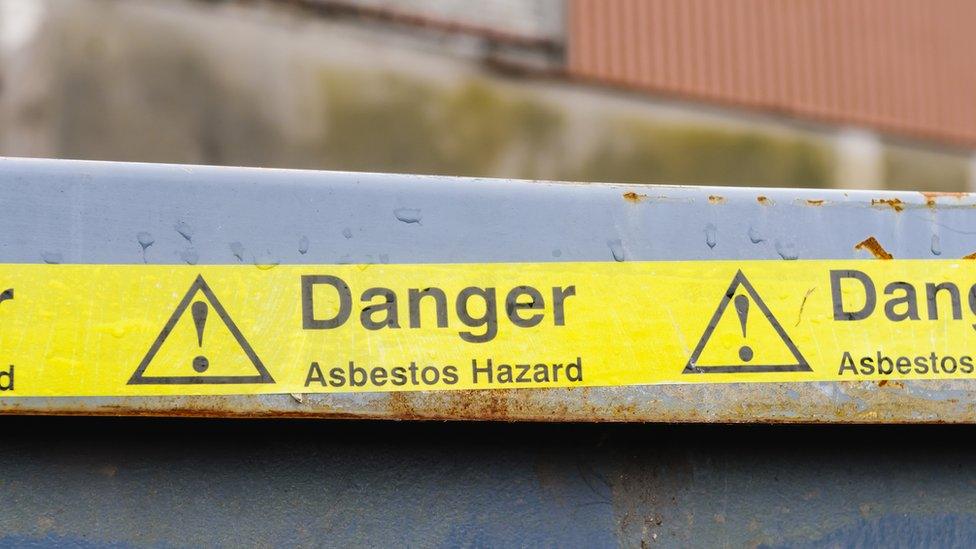Schools failing to report asbestos details
- Published

Nearly a quarter of schools in England (23%) have not told the government how much asbestos they have in their buildings and how they are managing the risks, a committee of MPs is warning.
Schools were asked to provide details to the government by 31 May last year.
But the Public Accounts Committee says it is "seriously concerned" about the Department for Education's lack of information about asbestos in schools.
It says schools that have not reported back should be "named and shamed".
Asbestos was banned in 1999 but was regularly used in construction until this date, including for some schools built between the 1950s and 1980s.
According to the National Education Union, since 2001 from mesothelioma, a form of cancer associated with asbestos.
Collating the facts
In March last year, the DfE started to collect data on how asbestos in England's schools was being managed and to check academy trusts and local authorities were responding appropriately.
"The department asked schools to respond by 31 May 2018. Due to the poor response rate, it extended the deadline to 25 June 2018 and then extended it again to 27 July 2018," the PAC report says.
"Despite this, only 77% of schools have responded and the department has extended the deadline yet again, to 15 February 2019, to allow the remaining 23% of schools to respond."
The committee adds: "We are not convinced that extending the survey deadline again will result in a much higher response rate."
The committee says the government needs to "understand fully the extent of asbestos in school buildings and how the risks are being managed" and should release the names of those schools that have not replied.
"In March 2019, the department should name and shame those schools which did not meet the February 2019 deadline and which have therefore repeatedly failed to respond to its asbestos-management survey," it says.
Meg Hillier, who chairs the committee, said: "It is not acceptable for schools to continue ignoring requests for details of asbestos in their buildings.
"Government needs to be clear how asbestos removal will be funded as it is not possible for schools to fund this from their existing budgets.
"Asbestos in schools can pose a significant threat to the health of pupils, staff and visitors.
"Where the risks are not being managed correctly, government must be prepared to step in."
Asbestos was used in many school buildings
But Geoff Barton, general secretary of the Association of School and College Leaders, said naming and shaming schools was not the right response and that the government must understand that schools needed money to address the issue.
"The committee suggests naming and shaming those bodies which have not responded but it would surely be more productive to understand what factors are holding up responses," he said.
"The real problem is not response rates but the fact that there is no clear plan at government level over how to fund the removal of asbestos from school buildings and schools are desperately short of the money they need to finance such work."
Kevin Courtney, joint general secretary of the National Education Union, said: "Failure to provide the DfE with information about management of asbestos in schools is putting lives at risk.
"These delays show that academy trusts and local authorities who bear overall responsibility for health and safety in schools are not facing up to their legal responsibilities."
Academy accountability
The asbestos warning comes in a report by the PAC about academy schools' accounts and performance.
It says children's education has been damaged by academy failures and the misuse of funds and calls for the governance of academy trusts to be strengthened and the DfE's oversight to be more rigorous.
The report also criticises academy chains for not communicating properly with parents and local communities, saying they have to fight to get "even basic information" about what's going on in individual academies.
Ms Hillier added: "When things go wrong in schools, pupils can be badly affected.
"We have seen the troubling consequences of poor governance and oversight of academy trusts.
"Government must raise its game to ensure the failures of the past are not repeated."
A spokeswoman for the DfE said: "We do not accept the PAC's negative characterisation of academies, in which standards of education have risen for thousands of pupils.
"Academies are subject to higher levels of accountability and transparency than local authority schools."